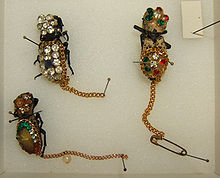Zopherus

| Zopherus | |
|---|---|

| |
| Zopherus chilensis | |
| Scientific classification | |
| Kingdom: | |
| Phylum: | |
| Class: | |
| Order: | |
| Family: | |
| Genus: | Zopherus Gray, 1832
|
| Type species | |
| Zopherus mexicanus Gray, 1832 | |
| Synonyms | |
|
Zopherodes Casey, 1907 | |
Zopherus is a genus of beetles comprising 19 species. They live in the Americas and are adapted to wood-boring. Some species are used as living brooches.
Distribution[]

Species of Zopherus only live in the Americas, where they are distributed from Venezuela to the southern United States.[1] Ten species live in the United States,[1] five of them in California.[2]
Description[]
Members of the genus are long and cylindrical, with very thick exoskeletons. Indeed, the elytra are so thick that it is often necessary to drill a hole in them in order to mount specimens.[3] Species living north of the Rio Grande are almost all uniformly black in colour, while the tropical species are almost all strongly patterned in contrasting black and white. The animal's head is largely hidden by the thorax. The elytra are fused together, rendering Zopherus species unable to fly.[3] Some species are used as living brooches.[4]
Ecology[]
Zopherus species are adapted for boring into wood, some species even being reported to bore into sound wood, rather than only dead wood.[4] Z. tristis lives under the bark of the desert tamarisk in the Colorado Desert, while Z. granicollis bores into the root crowns of Jeffrey pine (Pinus jeffreyi) and single-leaf pine (Pinus monophylla).[2]
Taxonomy[]
The genus Zopherus encompasses species previously referred to three other genera, Megazopherus, Zopherinus and Zopherodes, all of which are now synonymized under Zopherus. Many of the species have also been known by a number of taxonomic synonyms.[3] The genus was initially erected in 1832 by George Robert Gray, using the spelling Zopheros. This was later emended by Laporte de Castelnau to the more usual transliteration Zopherus; the authorship should nonetheless ascribed to Gray, and not to Laporte, as many authors have done.[3]
Use as living jewels[]
The species Zopherus chilensis from Yucatan, Mexico has been used in jewelry as living jewels.[5]
Etymology[]
The name Zopherus is from the Greek: zopher, meaning "dusky" or "gloomy".[1]
Species[]
Charles A. Triplehorn recognised 19 species in his 1972 monograph:[3]
- Champion, 1884
- Zopherus championi Triplehorn, 1972
- Zopherus chilensis Gray, 1832
- Zopherus concolor LeConte, 1851
- Zopherus elegans Horn, 1870
- Zopherus gracilis Horn, 1867
- Zopherus granicollis Horn, 1885
- Zopherus jansoni Champion, 1884
- Zopherus jourdani Sallé, 1849
- Zopherus laevicollis Colier, 1841
- Gray, 1832
- Zopherus nervosus Solier, 1841
- Zopherus nodulosus Solier, 1841
- Horn, 1867
- Zopherus sanctaehelenae (Blaisdell, 1931)
- Triplehorn, 1972
- Zopherus tristis LeConte, 1851
- Zopherus uteanus (Casey, 1907)
- Zopherus xestus Triplehorn, 1972
References[]
| Wikimedia Commons has media related to Zopherus. |
- ^ a b c Mike Quinn (September 6, 2008). "Southwestern Ironclad Beetle Zopherus nodulosus haldemani Horn". Texas Beetle Information. Retrieved March 31, 2010.
- ^ a b Arthur V. Evans & James N. Hogue (2006). Field guide to beetles of California. Volume 88 of California natural history guides. University of California Press. pp. 221. ISBN 978-0-520-24657-7.
- ^ a b c d e Charles A. Triplehorn (1972). "A review of the genus Zopherus of the world (Coleoptera: Tenebrionidae)" (PDF). Smithsonian Contributions to Zoology. 108: 1–20.
- ^ a b Michael A. Ivie (2002). "105. Zopheridae". In Ross H. Arnett & Michael Charles Thomas (ed.). American Beetles: Polyphaga: Scarabaeoidea through Curculionoidea. Volume 2 of American Beetles. CRC Press. pp. 457–462. ISBN 978-0-8493-0954-0.
- ^ Observaciones sobre la biología del Maquech, Zopherus chilensis Gray, 1832 (Coleoptera: Zopheridae) en Yucatán, México. Jesús Miss y Enrique Reyes Novelo Con acceso el 14 de junio de 2012.
- Zopheridae
- Woodboring beetles
- Beetles of North America
- Taxa named by George Robert Gray